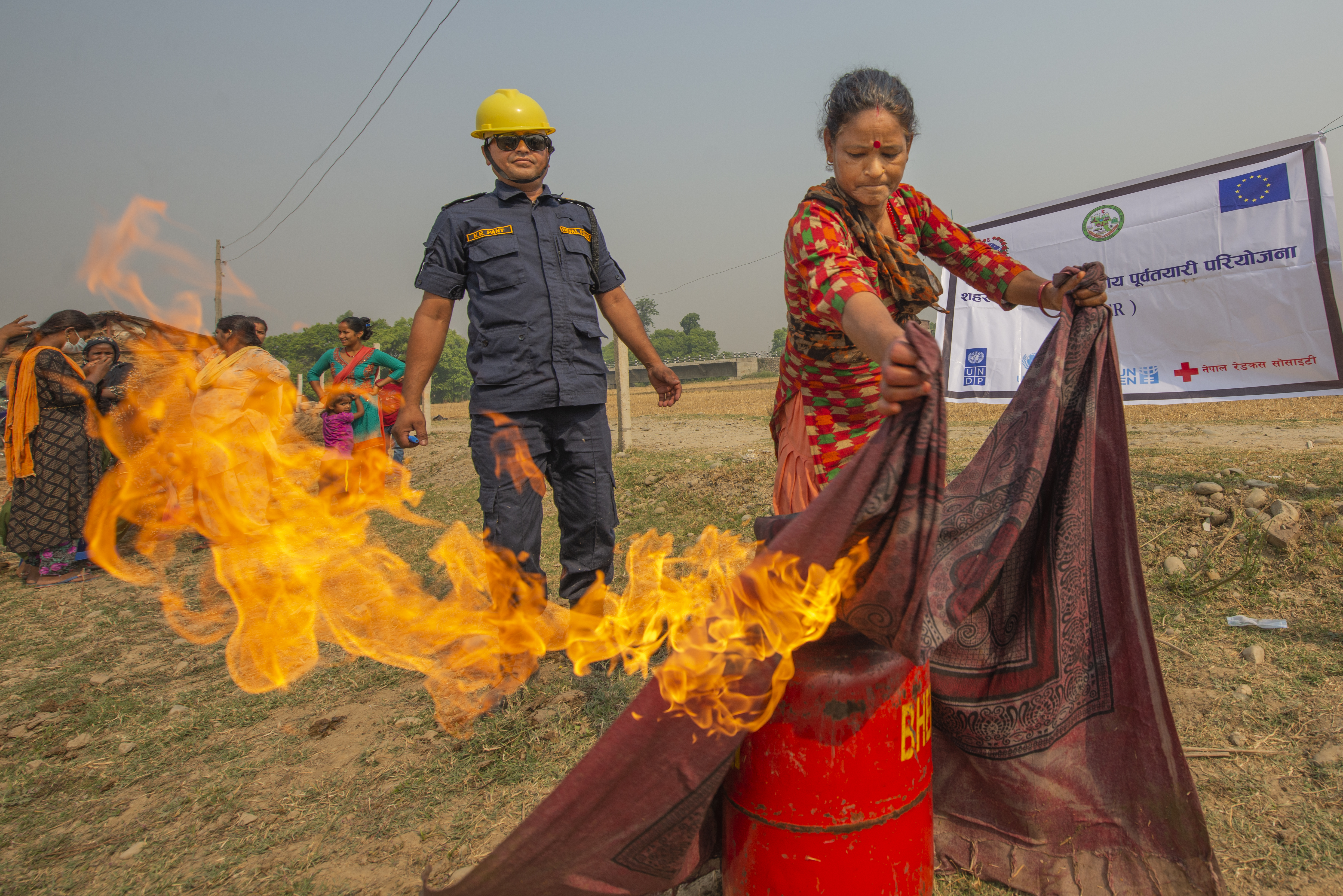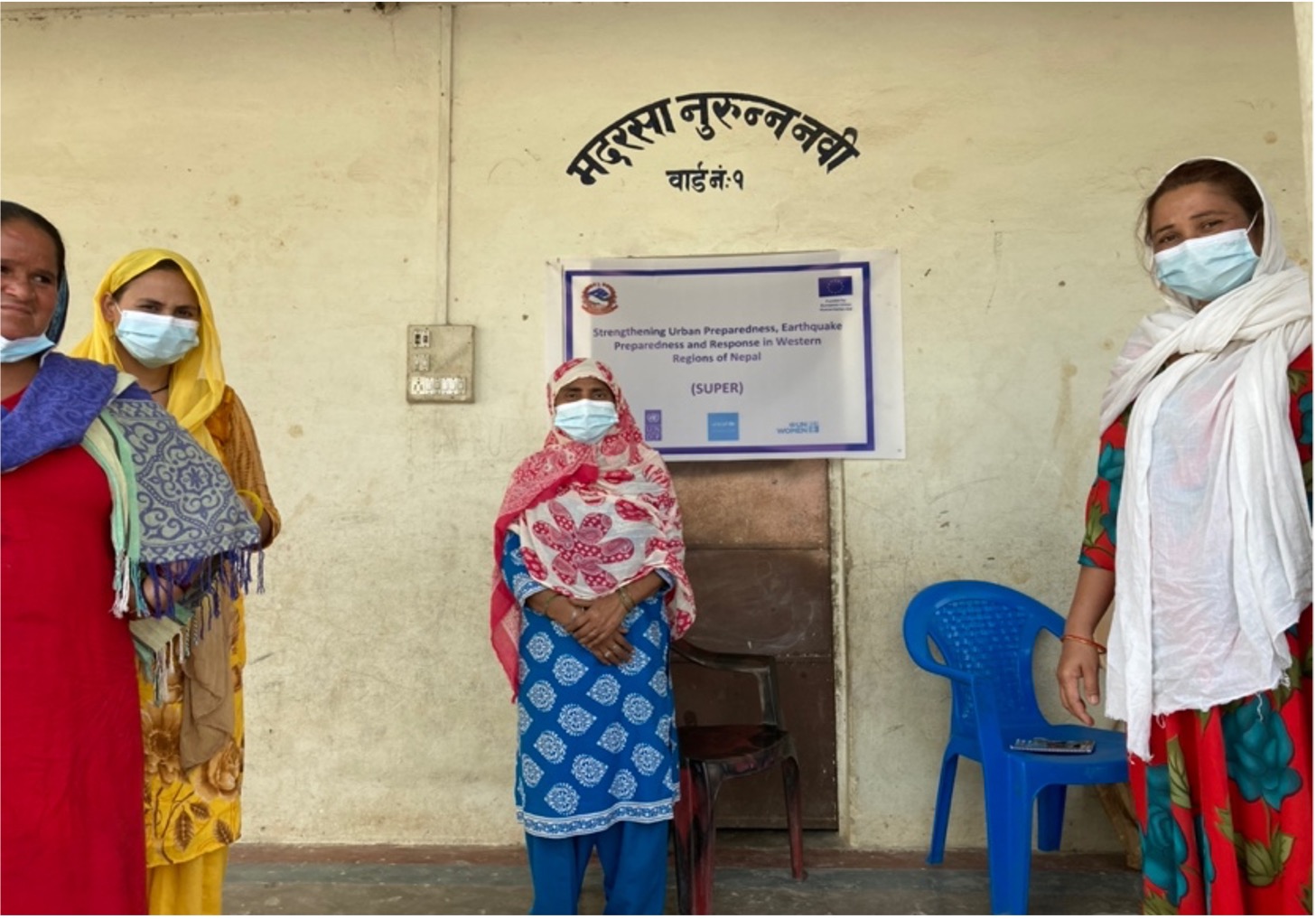Trainings that save lives
August 12, 2022

It was a slow afternoon for Nazma Salmani when she was sitting in her charpai (stool) and watching her husband as he replaced the gas cylinder in their house. He was hunched over the cylinder, inserting the regulator when suddenly, the gas started leaking and caught fire.
A fretted, Nazma exclaimed, “Ab kya kare!” (What to do?) She struggled to understand what she could do as panic besieged her: “I knew if the fire spread, it would be disastrous.”
And right she was. Nazma lives in Ward No. 1 in Dhangadhi Sub-Metropolitan City, where the buildings stand frailly with an aura that indicates that they have survived through multiple disasters; but barely. Most of the houses are non-engineered here, and stand dangerously close to one another, facing imminent disaster threats, including fires, which spread quickly, consuming societies as a whole.
A Vulnerability and Capacity Assessment conduced in Nazma’s ward shows that her community is susceptible to multi-hazards, and there is limited capacity to respond to such crises, should they strike. Understanding this underlying need to enhance the capacity of the community members in the face of disasters, the EU Humanitarian Aid funded Strengthening Urban Preparedness, Earthquake Preparedness and Response in Western Region of Nepal (SUPER) project has been working to provide orientations on firefighting to women, who are often at the forefront during a kitchen fire incident, to capacitate them to deal with the fire.

Faheen Fathama, Nazma Salmani’s daughter, shows the point that caught fire in the cylinder, which she put out.
Recalling the firefighting training she attended, Nazma shares, “I had taken a firefighting training conducted by SUPER project. During the training, I had learned how to put out fires using a damp cloth. And the best thing I did after the training was share my learnings with my daughter, because she is the one who put out the fire in our house using a damp cloth, just like I had shared with her.”
Already these trainings are proving to be popular as other wards have started requesting for firefighting trainings. Laxmi Joshi, Disaster Risk Reduction Focal Person at Sudarpaschim Province says, “Fire hazards are very common here. And the frequency of fire hazards grow higher depending on the weather.” He notes that the province is doing a lot to address the response mechanisms against disasters. But he knows, “There is more to be done.”
He also shares his experience from a recent exposure visit to Emergency Operation Centers (EOCs), in Banke District and Bharatpur Metropolitan City. EOCs essentially serve as coordination and communication points for disaster information across Nepal, as well as a knowledge hub for those interested in learning about disasters. EOCs exist at the local, district, provincial and national level and are operational 24 hours to prepare against and respond to various disasters. The EOC in Bharatpur was set up with financial support from the EU Humanitarian Aid. He shares, “The SUPER project took us on an exposure visit to learn about disaster preparedness and system strengthening at different levels. Since returning from the visit, we are working to allocate budget from the provincial Ministry for disaster preparedness, including to provide trainings at select schools in coordination with the security personnel.”
Investing in disaster preparedness for the community, especially in the youth, is certainly a big win for the community stakeholders. Nazma, admiring her twenty-year-old daughter’s presence of mind, expresses, “I am so proud that my daughter remained calm and was able to follow the instructions I had shared with her on putting the fire out. At the end of the day, I am glad I received the training, which I passed on to my family. This training turned out to be a lifesaving one for us!”

Nazma Salmani stands with her community members, in her local Madarasa.
According to data from the Provincial Emergency Operation Centre in the Ministry of Internal Affairs and Law, in Sudurpaschim Province, the province recoded approximately 194 fire related incidents from July/August 2021 till date.
SUPER, under the EU Humanitarian Aid’s generous financial support, is being implemented by UNDP, UNICEF and UN Women. In Dhangadhi Sub-Metropolitan City, the project’s local implementing partner is Nepal Red Cross Society. The project seeks to enhance municipal and provincial preparedness for impending urban and earthquake risks for effective disaster response in select places in the western regions of Nepal.

 Locations
Locations